Parliament disappointed with lack of progress as Hungary blocks EU seven-year budget review negotiations. Proposed cuts to R&I still on the table

Hungarian Prime Minister Viktor Orbán has opposed a €50 billion financial package for Ukraine, holding up a wider agreement on the EU's Multiannual Financial Framework. Photo: European Union
EU leaders failed to reach a deal on a seven-year budget review despite late-night negotiations on Thursday, postponing until January a decision that includes potential cuts to Horizon Europe.
The deal currently on the table, supported by all 27 member states except Hungary, would mean €2.1 billion in cuts for the €95.5 billion Horizon Europe research programme, as well as cuts in other programmes. Under the plan, that money would go instead to meet new challenges, such as support for Ukraine and the European Defence Fund, without forcing member states to contribute more than already planned when the current budget cycle began in 2021.
But Hungary is blocking the deal, refusing to allow a €50 billion top-up for Ukraine – in part to force the EU to release funds to Budapest that have been held up in a dispute over EU findings that the government of Victor Orbán isn’t upholding rule-of-law requirements.
The resulting budget dispute is jeopardising not only aid to Ukraine but other changes to the seven-year EU budget proposed by the European Commission in June, such as a new Strategic Technologies for Europe Platform (STEP). Negotiations will restart in January.
“The MFF Revision as set out in this document, in all its components and priorities […] is firmly supported by 26 Heads of State or Governments. We will revert early next year,” a Council statement said.
European Parliament members expressed disappointment with the lack of progress and ambition when it comes to the negotiations and Europe’s competitiveness.
MEPs Christian Ehler and José Manuel Fernandes issued a statement deploring the €2.1 billion cut to Horizon Europe and the proposal to reduce STEP to a €1.5 billion initiative, by slashing €8 billion off the proposal.
The EU4Health programme is also set to lose a big chunk of its money, with a foreseen €1 billion cut to the €5.3 billion health fund.
The only research-adjacent fund set to benefit is the European Defence Fund, for which the member states propose a €1.5 billion top-up as part of STEP.
“Technological innovation is one of the key areas of European excellence – cutting important research funding to the benefit of other programmes is not acceptable, as it threatens Europe´s future wellbeing and competitiveness,” said Ehler, Parliament’s lead negotiator for STEP. “We will continue to fight for our budget until there is an agreement that lives up to these promises.”
The member states will have to face the Parliament once they agree a position of their own. With the Parliament wanting to top up spending rather than slash it, it’s likely to be another round of tough negotiations in the new year.
The research community, not surprisingly, also opposes cuts. Mattias Bjornmalm, secretary general of the university association CESAER, called the proposal “unacceptable and counterproductive.”
Kurt Deketelaere, secretary general of the League of European Research Universities, condemned the proposal and said “the EU institutions are becoming more and more an obstacle for research, instead of being a facilitator.”
This member states’ reluctance to dish out cash spells difficulties going forward, as the Commission prepares to draft the next seven-year EU budget, due to start in 2028. The research community and Parliament want the next research budget to be at least double the current one, demanding a minimum of €200 billion.
It’s a hefty ask and unlikely to come through, as some observers think the best that member states may be willing to give is the existing €95.5 billion research budget plus inflation – if that.





 A unique international forum for public research organisations and companies to connect their external engagement with strategic interests around their R&D system.
A unique international forum for public research organisations and companies to connect their external engagement with strategic interests around their R&D system.